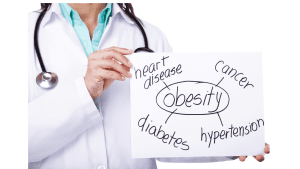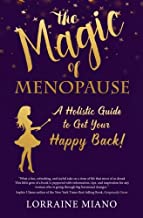Have You Heard of ‘Obesogens?’ If You’re Post-Menopausal, You Need to Know How to Avoid Them, As They Are Likely Sabotaging Your Weight & Health
By Lorraine Miano, NABBW’s Holistic Menopause Health Associate
During the post-menopause years, many women find that they have difficulty maintaining a healthy weight. Unfortunately, obesity has become an epidemic in the United States. Did you know that according to the CDC, 43.3% of women over the age of 40 are considered obese? Obesity-related illnesses of cardiovascular disease, stroke, type 2 diabetes, and certain types of cancer are among the leading causes of preventable, premature death.
There could be multiple reasons for this, from a poor diet and lack of movement to hormone imbalances caused by a newly discovered threat to public health, obesogens.
What exactly are obesogens? According to the NIH, Endocrine disrupting chemicals (EDCs) are defined as exogenous chemicals, or a mixture of chemicals, that can interfere with any aspect of hormone action.” These can include the pharmaceuticals we use, skincare items, cleaning supplies, the food we eat, our water supply among many other environmental toxins. We are continually bombarded with these toxins on a daily basis.
The NIH states that “Recently, EDCs have been implicated in metabolic syndrome and obesity. Adipose tissue is a true endocrine organ and, therefore, an organ that is highly susceptible to disturbance by EDCs.”
 A subset of EDCs, called “obesogens” promote adiposity by altering the programming of fat cell development, increasing energy storage in fat tissue, and interfering with neuroendocrine control of appetite and satiety.” In a nutshell, obesogens are messing with our storage of fat, our weight, and our health.
A subset of EDCs, called “obesogens” promote adiposity by altering the programming of fat cell development, increasing energy storage in fat tissue, and interfering with neuroendocrine control of appetite and satiety.” In a nutshell, obesogens are messing with our storage of fat, our weight, and our health.
According to Healthline.com, “Some obesogens have not only been linked to obesity but also to birth defects, premature puberty in girls, demasculinization in men, breast cancer and other disorders.” Exposure to obesogens can happen in the womb, leading to a child’s possible increased risk of obesity later in life.
So how do we mitigate our exposure to all of these toxins and their effects on our health and weight? The following are some simple steps you can take now to reduce your toxic load of these endocrine-disrupting obesogens:
- Eliminate products that contain BPA (Bisphenol-A ) which is a synthetic compound found in many types of products, including baby bottles, plastic food, and beverage containers, as well as metal food cans. Be aware that even cans labeled “BPA-free”, could be harboring other EDCs. Steer clear of plastics with the number 3 or 7 on the bottom, which may contain BPA. Instead, look for the numbers 1, 2, 4, 5, and 6, which are unlikely to contain BPA.
- Eliminate products that contain phthalates, which are chemicals used to make plastics soft and flexible. You can find these chemicals in food containers, toys, beauty products, and pharmaceuticals, among other products. Watchwords include vinyl, PVC, or the #3 recycling code. A “plasticky” smell is another fast giveaway. One study found that phthalate metabolites in the blood correlated with type 2 diabetes.
- Avoid exposure to Atrazine, which is one of the most widely used herbicides in the US. According to Healthline.com, “In the US, there is an overlap between the areas that use the most atrazine and the prevalence of obesity.”
- Avoid Perfluorooctanoic acid (PFOA), which is a synthetic compound found in non-stick cookware made with Teflon. You may also find it in microwave popcorn. Best to use air-popped or stovetop. Avoid using stain and water-protecting treatments on your carpets and furniture, as they usually contain PFOA.
- Use only organic, natural skincare and cosmetics. You can check your products at https://www.ewg.org/skindeep
- Eat organic meats (hormone and antibiotic-free) and vegetables as often as possible, avoiding conventionally grown food.
- Eat wild-caught fish vs. farm-raised.
- Use cast iron or stainless-steel cookware, avoiding non-stick cookware.
- Do not use plastic water bottles. Use a reusable stainless steel or glass water bottle instead.
- Do not store food in plastic containers. Use glass or stainless steel instead.
- Use only glass baby bottles and avoid plastic children’s cups (Be sure to share this fact with your children!)
- Use a water filter to eliminate contaminants. A whole house filter is best but at the very least use one for your drinking water, and a shower head filter. (Our skin absorbs whatever we put on it)
- Use only clean and green cleaning products. DO NOT use Fabric softeners.
- Vacuum, dust, and mop as often as possible to eliminate chemicals that accumulate in household dust.
- Take your shoes off when entering your house to reduce pesticides and other outdoor chemicals from coming into your home.
- Avoid using air fresheners. Instead, use dried lavender or essential oil diffusers.
- Go to parks that are pesticide-free. Check with your town, or search “pesticide-free parks”.
The obesogenic field is still in its infancy, and research is continuing, as there are numerous ramifications for prenatal and postnatal care and the control/prevention of obesity and metabolic syndrome.
As menopausal women who are naturally at higher risk for numerous health conditions, it is time we pay attention to the effect our environment has on our health.

 Lorraine Miano is an Integrative Certified Health Coach and author of the book, “The Magic of Menopause: A Holistic Guide to Get Your Happy Back!” She is especially passionate about working with women in all phases of menopause, with the clear goal of helping us overcome any weight, metabolism and aging concerns, so we can have more energy, less stress, and feel comfortable in our own skin.
Lorraine Miano is an Integrative Certified Health Coach and author of the book, “The Magic of Menopause: A Holistic Guide to Get Your Happy Back!” She is especially passionate about working with women in all phases of menopause, with the clear goal of helping us overcome any weight, metabolism and aging concerns, so we can have more energy, less stress, and feel comfortable in our own skin.



Leave a Reply
You must be logged in to post a comment.